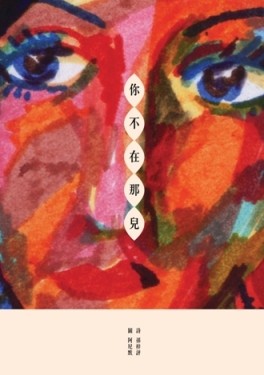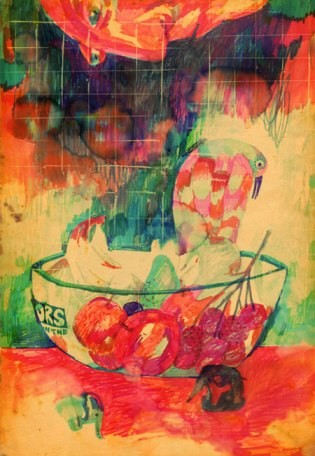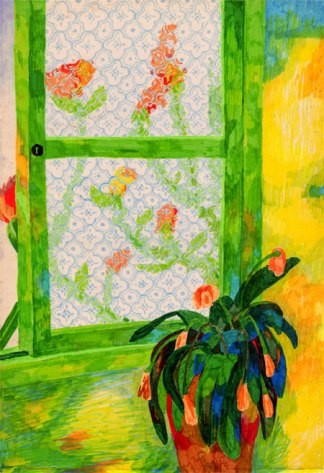
好久沒回花蓮了。不知道當時的月亮是否已經掠過這個那個流星?
剛好陳黎老師邀請,我獲得重返花蓮的機會,還跟詩歌沾了邊。為了參與「2010端午松園詩歌月」,我交了幾首詩,方便朗誦的〈如果敵人來了〉、實在無法翻譯的〈空旅行〉、短詩〈置身〉,還有就是《你不在那兒》其中十首。
這十首,當初寫的時候,就刻意希望它們的觸角廣泛些。去撫摸那些「你不在那兒」的生活,或許,「我也不在那兒」。儘管如此,卻有人真切地過著滿布傷痕的人生(甚至不自知)。
詩被翻譯成英文是一次赤裸的閱讀。剝開語義的曖昧處,給出一種(確定的)身體。謝謝陳黎老師和張芬齡小姐的翻譯。

你不在那兒
You Aren’t There(10 / 150)
1
雪下到喉嚨的高度
視線所及都是
來不及逃生的歌
The snow has piled up to the throat.
Within the sight are
songs too late to escape.
2
整個世界像熟透的水果搖晃
裂縫中的嬰兒
閉著眼睛吸吮灰塵
The whole world is like a fully ripe fruit swinging.
The infant in the crevice
is sucking dust with its eyes closed.
3
在雨林消失前
用手中最後一張紙
摺出太陽
Before rainforests disappear,
make an origami sun
with the last sheet of paper.
4
走廊上互擲流星的人們
發現胸口長出黑洞
長長的一生
只能用眼淚慶祝
Those who cast falling stars at each other in the corridor
have found black holes growing out of their chests.
The lengthy lifetime
can be celebrate only with tears.
5
雞鴨禁見之後
手抄本童話從此缺佚兩頁
孩子們在寒流中酣睡
渾然未覺
Since chickens and ducks were forbidden to see visitors,
two pages have been missing in the manuscript nursery tale.
Children are soundly asleep in the cold current,
totally unaware of it.
6
海嘯衝破了視窗——
當無數透明的手交換時間的淨利
數字們安靜且零亂地停靠在
空無一人的沙發
Tsunamis break through the window——
while numerous transparent hands exchange for the net profit of time,
numbers berth quietly and disorderly on
a deserted sofa.
7
兩艘潛艇海底相遇
發出比蝦微弱的求愛聲響
沒有人知道
任何肢體碰觸是否就將毀滅世界
Two submarines meet at the bottom of the ocean,
making courting sounds weaker than shrimps.
No one knows
if any physical contact of theirs will destroy the world.
8
白夜——牛奶被打翻了
潑在地上模仿血
傷心的人們蒙眼散步
以為能用黑暗
兌換彩虹
The white night—— the upset milk
is spilt on the ground to mimic blood.
Sad people take a walk with eyes blindfolded,
thinking they can exchange darkness
for a rainbow.
9
棲身神祇所熟知的苦難
學習成為一棵小樹的父親
等他長高,並肩
一齊聆聽遠方冰架崩塌
I perch on the misery well known to gods,
learning to become a small tree’s father.
When he grows taller, we can listen side by side
to the distant Antarctic ice shelf falling down.
10
「那裡在賣什麼?」
「我們已經擁有的東西。」
“What do they sell there?”
“Things we’ve already owned.”

蓮花櫻花,洄瀾東京:台灣與日本詩人的詩歌八重奏
99年6月12日(週六)14:30至16:30 地點:松園別館
(一) 在微風的午後,享受一場有詩、有歌、有茶、有點心的心靈與官能對話。
(二) 由詩人陳黎主持,邀請日本著名女詩人蜂飼耳,詩評家岡部明日香、翻譯家上田哲二兩位博士,台灣詩人孫梓評,以及詩評家曾珍珍、李進益、張梅芳與簡齊儒四位博士等,進行一場包含日本現代詩、古典短歌、台灣現代詩、近代短歌等的精彩詩歌多向對話及多聲道演出。詩人們將和聽眾分享私密詩的喜悅。在悠閒的松園,緩緩地帶領我們體會詩歌與人生的種種況味。
(三) 詩人們將親自為現場聽眾題寫自己最喜歡的詩句,做為2010端午詩歌月的美好紀念。
人人玩詩,日日快樂:現代詩的多樣演出
99年6月13日(週日)14:30至16:30 地點:松園別館
(一)邀請各界人士(不拘年齡、性別、身分)自由組隊參加演出,每隊由2至8人組成,一起來朗讀、詮釋、呈現主辦單位精選的中外現代詩傑作(參賽隊伍10隊)。每隊演出時間5到7分鐘。除了以國語朗讀外,參賽者可結合創意詮釋詩作(方言、外語、音樂、道具、肢體語言…)。由主辦單位於公佈之十首詩作中,以抽籤方式並通知參賽隊伍依指定詩作詮釋表演。「松園金聲獎」第一名1隊獎金3000元,第二名2隊各得獎金2000元。其他各隊亦可獲得參加獎金1000元,另各頒獎狀。
(二)邀請著名詩人現場解說作品意函或朗誦詩作,和與賽者交流。
(三)鼓勵民眾相互激盪創意,讓詩融入生活,使生活更活潑、有味。
http://www.hccc.gov.tw/cultural/sub03/activity_show.php?sn=445
photo:阿尼默。
文章定位:


